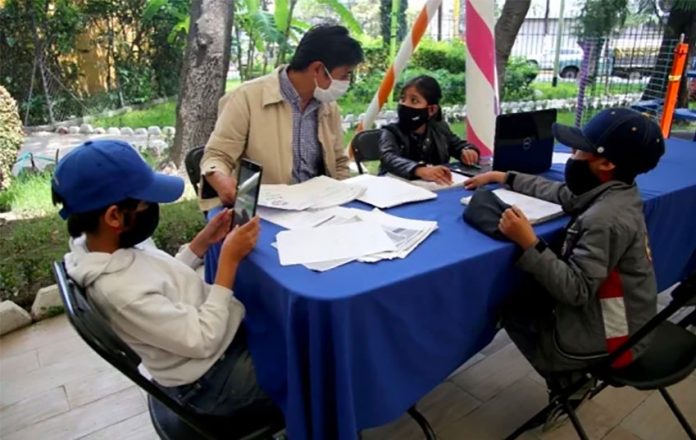A day in the park might sound like fun but for some children in Mexico City it’s all about hard work.
The Fortino Serrano Park is one of 80 places in the borough of Venustiano Carranza where authorities are lending tablet computers to students so they can complete their schoolwork, which has largely shifted online due to the coronavirus pandemic.
Jair, an architect, takes his three primary school-aged children to the park every weekday so they can keep up to date with their classes.
In addition to borrowing tablets and connecting to the park’s wireless internet, students can also print documents free of charge.
Jair (whose last name was not given) told the newspaper El Universal that he gets up early every morning to start his own work – he’s not currently going to his office due to the pandemic – before preparing breakfast for his children.
The kids then watch televised classes until 10:00 a.m. after which they set off for the park with their dad.
“We’ve been coming daily for the internet and to print,” Jair said.
“We only have one computer at home and sometimes the video calls [from teachers] come at the same time. … Printing and scanning is also expensive,” he said.
“It’s not easy, I have to divide up my work. I work in the morning, I come with them [to the park] and I keep working afterwards. Sometimes I also have to work here,” Jair added.
He spends a lot of his time, however, helping his third grade twins – a boy and a girl – and his fifth grade son understand their schoolwork and checking it when they’ve finished.
At 2:00 p.m. they take a break while cleaning staff sanitize the area where the students work but by 4:00 p.m. the kids are back at it, finishing off their class work and doing any homework they might have.
Manuel Vargas Cardoni, director of culture, recreation and sport with the Venustiano Carranza council, said that any students who live in the municipality can borrow a tablet and print out the school documents they need.
“We have 50,000 families with economic deficiencies in the municipality and they can’t take their children to internet cafes. That’s why we provide [free internet] service at 80 places including 16 libraries and five parks,” he said.
Vargas explained that access to the park during the week is limited to students doing school work.
“It’s not a good idea to have children running and playing while others are concentrating,” he said.
Hundreds of thousands if not millions of students across Mexico don’t have access to a computer and/or the internet at home, and some don’t have televisions or can’t pick up the signal to watch televised classes.
As is often the case in Mexico, some innovative solutions to the problems have been found.
A tortilla maker in Mexico City converted the bed of a pickup truck into a virtual classroom for disadvantaged children while a devoted teacher in Michoacán decided to travel to the homes of each of her students and teach them in person.
Source: El Universal (sp)
